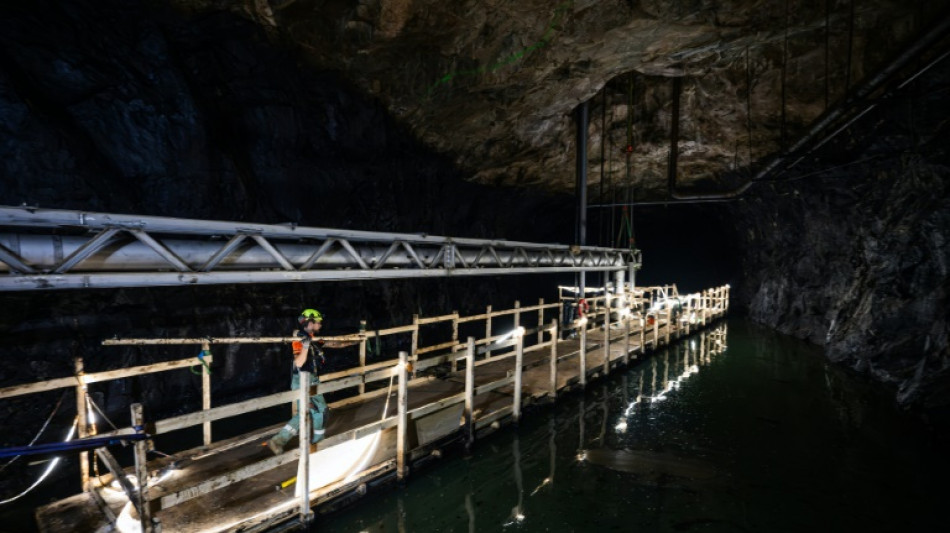
-
 Osimhen and Mane score as Nigeria win to qualify, Senegal draw
Osimhen and Mane score as Nigeria win to qualify, Senegal draw
-
Osimhen stars as Nigeria survive Tunisia rally to reach second round

-
 How Myanmar's junta-run vote works, and why it might not
How Myanmar's junta-run vote works, and why it might not
-
Watkins wants to sicken Arsenal-supporting family

-
 Arsenal hold off surging Man City, Villa as Wirtz ends drought
Arsenal hold off surging Man City, Villa as Wirtz ends drought
-
Late penalty miss denies Uganda AFCON win against Tanzania

-
 Watkins stretches Villa's winning streak at Chelsea
Watkins stretches Villa's winning streak at Chelsea
-
Zelensky stops in Canada en route to US as Russia pummels Ukraine

-
 Arteta salutes injury-hit Arsenal's survival spirit
Arteta salutes injury-hit Arsenal's survival spirit
-
Wirtz scores first Liverpool goal as Anfield remembers Jota

-
 Mane rescues AFCON draw for Senegal against DR Congo
Mane rescues AFCON draw for Senegal against DR Congo
-
Arsenal hold off surging Man City, Wirtz breaks Liverpool duck

-
 Arsenal ignore injury woes to retain top spot with win over Brighton
Arsenal ignore injury woes to retain top spot with win over Brighton
-
Sealed with a kiss: Guardiola revels in Cherki starring role

-
 UK launches paid military gap-year scheme amid recruitment struggles
UK launches paid military gap-year scheme amid recruitment struggles
-
Jota's children join tributes as Liverpool, Wolves pay respects

-
 'Tired' Inoue beats Picasso by unanimous decision to end gruelling year
'Tired' Inoue beats Picasso by unanimous decision to end gruelling year
-
Thailand and Cambodia declare truce after weeks of clashes

-
 Netanyahu to meet Trump in US on Monday
Netanyahu to meet Trump in US on Monday
-
US strikes targeted IS militants, Lakurawa jihadists, Nigeria says

-
 Cherki stars in Man City win at Forest
Cherki stars in Man City win at Forest
-
Schwarz records maiden super-G success, Odermatt fourth

-
 Russia pummels Kyiv ahead of Zelensky's US visit
Russia pummels Kyiv ahead of Zelensky's US visit
-
Smith laments lack of runs after first Ashes home Test loss for 15 years

-
 Russian barrage on Kyiv kills one, leaves hundreds of thousands without power
Russian barrage on Kyiv kills one, leaves hundreds of thousands without power
-
Stokes, Smith agree two-day Tests not a good look after MCG carnage

-
 Stokes hails under-fire England's courage in 'really special' Test win
Stokes hails under-fire England's courage in 'really special' Test win
-
What they said as England win 4th Ashes Test - reaction

-
 Hong Kongers bid farewell to 'king of umbrellas'
Hong Kongers bid farewell to 'king of umbrellas'
-
England snap 15-year losing streak to win chaotic 4th Ashes Test

-
 Thailand and Cambodia agree to 'immediate' ceasefire
Thailand and Cambodia agree to 'immediate' ceasefire
-
Closing 10-0 run lifts Bulls over 76ers while Pistons fall

-
 England 77-2 at tea, need 98 more to win chaotic 4th Ashes Test
England 77-2 at tea, need 98 more to win chaotic 4th Ashes Test
-
Somalia, African nations denounce Israeli recognition of Somaliland

-
 England need 175 to win chaotic 4th Ashes Test
England need 175 to win chaotic 4th Ashes Test
-
Cricket Australia boss says short Tests 'bad for business' after MCG carnage

-
 Russia lashes out at Zelensky ahead of new Trump talks on Ukraine plan
Russia lashes out at Zelensky ahead of new Trump talks on Ukraine plan
-
Six Australia wickets fall as England fight back in 4th Ashes Test

-
 New to The Street Show #710 Airs Tonight at 6:30 PM EST on Bloomberg Television
New to The Street Show #710 Airs Tonight at 6:30 PM EST on Bloomberg Television
-
Dental Implant Financing and Insurance Options in Georgetown, TX

-
 Man Utd made to 'suffer' for Newcastle win, says Amorim
Man Utd made to 'suffer' for Newcastle win, says Amorim
-
Morocco made to wait for Cup of Nations knockout place after Egypt advance

-
 Key NFL week has playoff spots, byes and seeds at stake
Key NFL week has playoff spots, byes and seeds at stake
-
Morocco forced to wait for AFCON knockout place after Mali draw

-
 Dorgu delivers winner for depleted Man Utd against Newcastle
Dorgu delivers winner for depleted Man Utd against Newcastle
-
US stocks edge lower from records as precious metals surge

-
 Somalia denounces Israeli recognition of Somaliland
Somalia denounces Israeli recognition of Somaliland
-
The Cure guitarist and keyboard player Perry Bamonte dies aged 65

-
 Draper to miss Australian Open
Draper to miss Australian Open
-
Police arrest suspect after man stabs 3 women in Paris metro


Remaking an old Swedish oil depot into a giant underground 'thermos'
Work lights strung up along railings illuminate a dank cavern where workers are preparing to transform a former oil depot into a hot water "thermos" to heat a Swedish town.
Originally dug out in the early 1970s, the three caverns with a combined volume of 300,000 cubic metres served as an oil storage until the site was abandoned in 1985.
"We are now converting it into a giant thermos to store hot water in," explained project manager Rickard Svensson at power and district heating company Malarenergi in the city of Vasteras.
The site will "store energy, which we sometimes have an excess of, and ... use that at times when there is a shortage," he said.
The caverns are close to Malarenergi's combined heat and power plant, which supplies electricity and especially heat via district heating, to Vasteras' 130,000 or so inhabitants.
Hundreds of metres of pipes are being installed along with massive heat exchangers, so excess heat can heat up the water stored within and then be used to transport heat out when needed.
In another area, workers are fitting hundreds of steel bars to make a thick reinforced concrete wall which will serve as a plug for the cavern.
Once the remodelling is completed, the entire cave system will be flooded and sealed for good.
The site had previously been emptied of oil but never properly decontaminated.
"It was an excellent fit to re-use the oil storage and thereby take advantage of an existing resource," Lisa Granstrom, strategy manager at Malarenergi, told AFP.
While the plant is already able to store heat in tanks above ground, they are nowhere near the size of the new installation.
The volume is roughly the equivalent of 6,000 backyard pools and can provide approximately 13 gigawatt hours (GWh), according to Malarenergi.
- New energy landscape -
Being able to store excess heat for future use means the utility can reduce the need to bring reserve plants, some of which rely on fossil fuels, online during cold snaps.
"It will even mean that during some days we'll be able to stop production and just rely on this cave, just using the heat from here," vice president Magnus Eriksson said.
In a climate where temperatures can range from minus 20 degrees Celsius (minus 4 Fahrenheit) in winter to plus 30 degrees (86 F) in summer, the "thermos" would be able to provide heat for "up to a week" on cold days and "around two weeks" in summer.
While the idea of converting such caverns is not novel, Malarenergi believes theirs is likely the largest of its kind.
Finnish utility Helen finished a similar project in 2021 on the island of Mustikkamaa near Helsinki with a capacity to store 11.5 GWh of energy.
Another, much larger project by Vantaa Energy is also planned for construction north of Helsinki, where the planned facility of 1,000,000 cubic metres will be able store 90 GWh of thermal energy using superheated water, according to the company.
Being able to store energy is a recurring challenge as countries seek to maximise the use of the energy that is produced.
"For both electricity and heat in the new energy landscape, storing energy is crucial to adjust to peaks in production and demand," Filip Johnsson, a professor of energy systems at the Chalmers University of Technology in Gothenburg, told AFP.
In the case of heating, producers can avoid having to start up redundancy plants during cold snaps -- which may rely on sources of energy such as oil or coal.
Meanwhile, there a different problem with wind power.
"When it's very windy, you get a lot of wind power that you can't use. But when it's not so windy there will be a shortage," Johnsson said.
He added that to make better use of wind power, excess energy can be stored in batteries or as hydrogen produced from electricity.
O.Norris--AMWN



